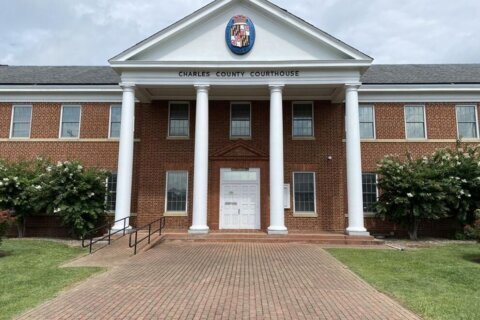This article was republished with permission from WTOP’s news partners at Maryland Matters. Sign up for Maryland Matters’ free email subscription today.
This content was republished with permission from WTOP’s news partners at Maryland Matters. Sign up for Maryland Matters’ free email subscription today.
A coalition of cycling groups has fallen short in their efforts to block the state from dismantling the old Nice-Middleton Bridge in Charles County.
A federal judge in Baltimore said late Tuesday that the organizations failed to meet the high legal threshold for blocking demolition, which lawyers for the state said will begin later this week.
Gov. Larry Hogan (R) and other dignitaries are scheduled to open the new span Wednesday morning.
During a three-hour court hearing, the lawyer hired by the cycling coalition said leaving the original Nice-Middleton Bridge in place would preserve the opportunity to use it for recreation. When Hogan announced plans to replace the 1940s-era bridge, he pledged to include a dedicated bike/pedestrian lane on the new span. Those plans were later dropped in a cost-cutting move.
In testimony before U.S. District Court Judge Deborah Boardman, former Virginia state Del. David Brickley, a leading advocate for the groups, said a restraining order would allow more time for citizens and local officials to pursue their options.
“When the old Nice Bridge is destroyed, it’s destroyed forever,” he said. “There is no re-do when Maryland unexpectedly blows up the bridge two days from now.”
As recently as this week, the Maryland Transportation Authority (MDTA), which owns and operates toll facilities in the state, listed “early 2023” as the opening date for the new bridge. On Tuesday, however, just hours before an emergency court hearing, the authority announced that the new bridge will open on Wednesday.
The 11th-hour announcement sparked speculation that the authority rushed completion of the replacement span to blunt the cycling groups’ lawsuit. Brickley called it “a quest to make sure the bridge can be incapacitated.”
Brian Wolfe, the MDTA’s director of project development, testified that the authority knew in June that the new span would be ready for traffic in late September or early October.
Wolfe and attorneys for the state argued that the old span is literally falling apart and soon could pose a danger to the public. They also maintained that groups looking to save it have yet to put forward a credible plan for financing its future needs and operating costs.
Much of the testimony focused on “scouring,” the phenomenon that occurs when two bridges in close proximity cause erosion of the soil at the base of the piers, leading to potential structural problems. Wolfe said preserving the old bridge would eventually cause problems for the new span.
The Nice-Middleton Bridge, named for former Gov. Harry W. Nice and former state Sen. Thomas “Mac” Middleton, carries Route 301 traffic over the Potomac River between Newburg, Maryland, and King George County, Virginia. Maryland added Middleton’s name to the bridge after he sponsored legislation requiring that a replacement be built.
The former senator, who has been invited to attend Wednesday’s ribbon-cutting, said he’s not surprised the judge rejected the bike groups’ request for a temporary restraining order.
“The bridge is in horrible condition,” Middleton said. “Just ride under it and see the rusted beams and the concrete pilings that are just corroding.”
He said “it would have been nice” if the new bridge had included the bike/pedestrian lane that was promised.
Lawyers for the state said demolition crews and equipment are on site and that a delay would have cost $21,000 a day.
The MDTA did not immediately react to Boardman’s ruling. It could not be learned on Tuesday why the authority hired outside counsel to defend itself against the cycling groups or how much the law firm, Venable, will charge for its services. Usually the Office of the Attorney General represents state agencies.
Brickley said the three groups that sought to preserve the existing span — the Potomac Heritage Trail Association, the Dahlgren Railroad Heritage Association and the Oxon Hill Bicycle and Trail Club — do not have money to file an appeal. He said the failure to include a bike/pedestrian lane on a bridge that is forecast to last 100 years is “a blight on Maryland.”
“The lack of transparency by the Maryland administration probably disappoints me as much as anything else,” he added. “That’s a sad thing for all of us to look at.”







